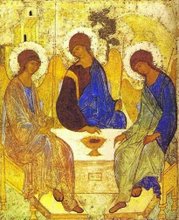The sacrifice of Abraham was really great, that was a strong Faith. He believed in the God who didn't have a name yet - Israelites had not yet existed, and they had not yet asked his name-. To me it seems that Abraham did believe what christians to day believe that God is Love. After all it would be foolishness to sacrifice your most beloved unless you know that you are sacrificing him to Love itself. I think this is where the confidence and trust of Abraham came from. He knew God would not abandon him or his son. Even though he may have not known what happens after death, he new that the Creator is Love itself and would take care even where human understanding can not reach. This is to me the only way the sacrifice of Abraham can make sens. And surely enough God who is love intervened to return the love to Abraham by giving him back his son.
Abraham could not have worked toward the unknown land by Faith alone if he did not know that God is Love itself, and that whatever was going to happen was going to happen out of love of/from God and that would be most glorious and worth it if it was really a sacrifice out of love. So I think this is the reel meaning Faith. St. Paul confirmed this when he said that faith without charity is dead. True Faith is shown by the way of living which is filled with charity.
Anyone who decide to 'believe' in the God of Abraham, in a sens, he takes the same Abraham journey to the unknown. He walks more and more "by faith not by sight". It is a life which seems to approch more and more into eternity, into the house of Love. And the words of Jesus gets more and more accomplished:
If any one love me, he
will keep my word. And my Father will love him and we will come to him and will
make our abode with him. John XIV 14:23
Jesus commandements was to love God above all and to love our neighbours as we love ourselves. Even though this commandement was not formulated yet, Abraham surely lived it. And this is illustrated most when he received a visit from the three 'men' that he called 'Lord'. While the situation is surely confusing, it surely shows how much devotion Abraham had for Love. One can say that he always did the Will of Love.
When Jesus told us that he always does the will of the Father, and that him and the father are One, I think he was slowly formulating a new revelation of God to us: the Trinity. Jesus sacrificed himself and called all who are baptised in the name of the Father, and the Son, and the Holy Spirit to do the same. Why? Because, like him, now they are of the house of Love. They participate in the life of the Trinity. This how a christian can be a co-redemptor like Mary:
"In my flesh I complete what is lacking in Christ's afflictions for the sake of his body, that is the Church." Colossians 1:24
So our sacrifices whether perfect or way less, can be useful to us and to others when we offer them up to God.
When we truly love, we can make mistakes because we are not perfect, but Love can help us fix those same mistakes and do even more virtuous deeds.
Love is still a mystery. Even though some christians think that one have to be christians in order to be saved. The Catholic Church believes that salvation is possible to some non-christians. How? Mark Shea reminds us of an important fact:
It is worth noting that the description of judgment in the parable of the SheepIt is interesting to note those judgement words (Matthew 25:32-46). As Mark Shea, I can conclude that: "We know where the Church is. We do not know where it is not."
and the Goats says nothing about having figured out correct doctrine. It
is all about people responding as best they can to the light they have.
Indeed, the mark of the saved sheep in that parable is surprise. By Jesus'
account, none of his followers among the "nations" (those outside the visible
covenant community) had the slightest idea they were serving him: "Then the
righteous will answer him and say, 'Lord, when did we see you hungry and feed
you, or thirsty and give you drink? When did we see you a stranger and welcome
you, or naked and clothe you? When did we see you ill or in prison, and visit
you?'" (Matthew 25:37-39).



No comments:
Post a Comment